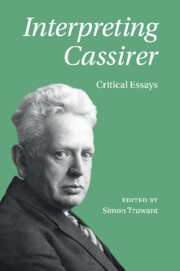Book contents
- Interpreting Cassirer
- Interpreting Cassirer
- Copyright page
- Contents
- Contributors
- Acknowledgments
- Abbreviations
- Introduction
- Part I Cassirer’s Philosophy of Culture
- Part II Cassirer’s Philosophy of Consciousness
- Part III Cassirer’s Philosophical Method
- Chapter 10 Cassirer’s Phenomenological Affinities
- Chapter 11 Cassirer’s Place in Today’s Philosophical Landscape
- Bibliography
- Index
Chapter 10 - Cassirer’s Phenomenological Affinities
from Part III - Cassirer’s Philosophical Method
Published online by Cambridge University Press: 17 April 2021
- Interpreting Cassirer
- Interpreting Cassirer
- Copyright page
- Contents
- Contributors
- Acknowledgments
- Abbreviations
- Introduction
- Part I Cassirer’s Philosophy of Culture
- Part II Cassirer’s Philosophy of Consciousness
- Part III Cassirer’s Philosophical Method
- Chapter 10 Cassirer’s Phenomenological Affinities
- Chapter 11 Cassirer’s Place in Today’s Philosophical Landscape
- Bibliography
- Index
Summary
Situating Cassirer in a historical perspective, Daniel D. Dahlstrom's chapter casts light on prominent lines of convergence and divergence between Husserl’s phenomenological analyses and Cassirer’s philosophical studies. The general topic of the first line of convergence is logical theory, as Husserl and Cassirer both argue for the autonomy of logic, the promise of set theory, and the intensionality of concepts.Other lines of agreement include their common rejection of empiricist accounts of abstraction and universals, their embrace of a Kantian philosophical legacy, and their respective commitments to the primacy of meaning and self-described versions of idealism. Nevertheless, the philosophies of Husserl and Cassirer diverge from one another in significant ways, primarily in view of the thematic range of their investigations and their respective insistence upon intuition and the sign or symbol as the basis of human consciousness and cognition. Dahlstrom focuses on differences in Husserl and Cassirer's analyses of intuitions and perceptions that Cassirer himself also pronounced.
- Type
- Chapter
- Information
- Interpreting CassirerCritical Essays, pp. 193 - 213Publisher: Cambridge University PressPrint publication year: 2021

